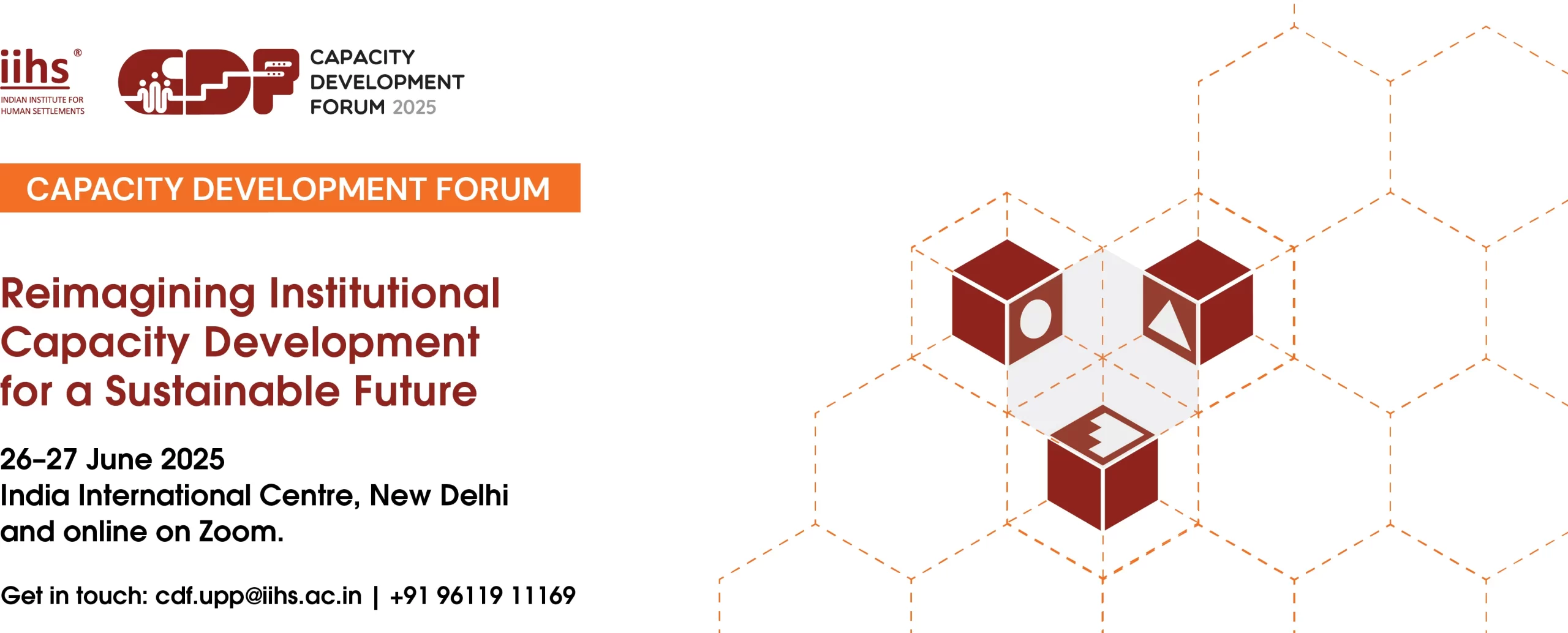Registrations for CDF 2025 have closed.
Institutions shape human interaction through systems of rules and norms, enabling stability, coordination, and progress. They are essential to how societies address development challenges, respond to crises, and pursue sustainability. Yet for much of the postcolonial era, institutional capacity was viewed narrowly—as the state’s technical ability to administer programmes and enforce rules. While this helped establish formal systems, it often overlooked participatory and adaptive dimensions that make institutions resilient and effective. Today, with increasingly complex challenges, institutional development must go beyond administrative reforms. It must engage a broad spectrum of actors—governments, the private sector, civil society, media, and informal networks—toward shared goals. Institutional capacity needs to be seen as a dynamic, society-wide capability to collaborate, learn, and adapt.
From the 1970s, multilaterals like the World Bank and International Monetary Fund invested in infrastructure across the Global South. By the 1990s, weak institutions and poor implementation exposed the limits of this approach. In response, the global agenda shifted to strengthening systems, focusing on decentralisation, governance reform, and long-term capacity. This shift is now central to the SDGs, especially SDG 16 (strong institutions) and SDG 17 (partnerships), which emphasise effective governance, cooperation, and resilience.
India’s experience reflects this transition. The Green and White Revolutions succeeded not just through technology, but through robust institutional ecosystems. Local innovations like Kudumbashree and Tamil Nadu’s mid-day meal scheme scaled into national programmes such as NRLM and PM-POSHAN. Yet, progress is uneven. As per NITI Aayog’s 2023 SDG Index, several states are lagging on key indicators like health, education, and gender equality. The challenge is often not innovation, but ensuring basic, equitable service delivery. Institutional capacity today must include not only systems and skills, but legitimacy, cross-sector coordination, and public engagement.
As we stand at the crossroads of unprecedented global challenges, the need to reimagine and strengthen institutional capacity has never been more urgent. Our institutions, governments, private sector entities, civil society, and international organisations, are the cornerstone of sustainable development, and their ability to adapt, innovate, and lead will define the trajectory of our collective future.
This forum brings together voices from policy, public enterprises, academia, international organisations, and civic networks across sectors to explore what it means to reimagine and develop institutional capacity today. By embracing innovative governance structures, forward-thinking policies, and inclusive approaches, we aim to chart a course that not only responds to immediate challenges but also anticipates future ones, ensuring institutions remain adaptable, equitable, and sustainable in the long term.
CDF 2025 will be held on 26–27 June 2025 in a hybrid format at the India International Centre and online. The convening will bring together a wide range of stakeholders to explore how institutional design can be a lever for systemic change, resilience, and long-term sustainability. Panels and workshops will examine critical issues such as transformative policy, innovative financing, digital governance, and urban service delivery.
Outcomes for CDF 2025
- Understand the evolving role of institutional design in shaping governance, policy implementation, and inclusive service delivery, particularly in the context of sustainability, infrastructure, and public accountability.
- Critically evaluate capacity development approaches that go beyond administrative and technical fixes to include leadership development, adaptive governance models, and institutional reforms.
- Identify innovative financial, digital, and regulatory strategies, from green financing and AI-enabled governance to performance-based planning, that enhance institutional responsiveness and cross-sector coordination.
- Gain actionable insights into strengthening state-local institutional relationships, through improved administrative training, participatory planning, and interdepartmental collaboration in areas such as urban development, disaster risk reduction, infrastructure and service delivery.
- Explore how Public Sector Undertakings (PSUs) and government bodies undertake digital transformation and embedding ESG principles into core institutional functions—moving from compliance-based models to proactive, integrated sustainability strategies.
- Draw on international case studies to strengthen domestic institutional capacity through contextual adaptation, peer learning, and global-local partnerships.
- Foster peer learning and strategic networking across sectors and States to build shared approaches to institutional capacity, leadership, and resilience.
Day 1 will feature insights into how transformative policy, innovative financing, and multilevel governance can shape future-ready institutions. The day’s panels will bring together policymakers, urban practitioners, development finance experts, and institutional leaders to explore practical strategies for strengthening institutional capacity at national, state, and local levels. Participants will also gain exposure to real-world models that address equity, service delivery, and sustainability through improved governance and institutional agility—laying the groundwork for responsive, resilient, and scalable public systems.
Day 2 will offer participants a deep dive into the evolving governance and institutional landscapes of Public Sector Undertakings and global infrastructure systems. The panels will feature PSU leaders and governance experts discussing how digital transformation, ESG integration, and leadership development are reshaping the role of PSUs in delivering sustainable infrastructure. In the global dialogue that follows, city leaders, international practitioners, and resilience experts will share cross-context lessons on strengthening institutional capacity to respond to systemic risks like climate change and inequality. The forum will culminate in an in-person workshop on social accountability and participatory governance.
| DAY 1 – THURSDAY, 26 JUNE 2025 | |
| 09.00 – 10.00 | Registration |
| 10.00 – 10.30 | Welcome Address |
| 10.30 – 11.00 | Keynote Address |
| 11.30 – 12.45 | Panel 1 – Transformative Policy Approaches for Strengthening Institutional Capacity |
| 14.00 – 15.15 | Panel 2 – Leveraging Financial Resources to drive Institutional Capacity Development |
| 15.30 – 16.45 | Panel 3 – Navigating State and Local Government Capacities for Urban Transformation |
| DAY 2 – FRIDAY, 27 JUNE 2025 | |
| 10.00 – 11.15 | Panel 4 – Digital Transformation and Governance Approaches in Capacity Development of PSUs |
| 11.30 – 12.45 | Panel 5 – Global Dialogue on Institutional Capacity Development |
| 14.00 – 14.30 | Way forward: Leader Speak |
| 14:30 – 14:45 | Tea Break |
| 14.45 – 16.30 | Learning Workshop: Accountable by Design: Strengthening Institutions through Participatory Governance |
| 16.30 – 16.40 | Vote of Thanks |
DAY 1
Welcome Address
Keynote Address

Bharat Lal, IFS
Secretary General & CEO, National Human Rights Commission (NHRC), New Delhi
Bharat Lal, IFS, a former civil servant with over three and a half decades of distinguished public service, currently serves as the Secretary General and CEO of the National Human Rights Commission (NHRC) of India. His career has been marked by pioneering initiatives in good governance, human rights, public service delivery, environmental conservation, and sustainable development—making impactful contributions towards improving quality of life, upholding dignity, and protecting the rights of marginalized and vulnerable communities, including women and tribal populations.
Before assuming his role at the NHRC in July 2023, he served as the Director General of the National Centre for Good Governance (NCGG), the Government of India’s apex institution for public policy and governance. Prior to that, as Secretary to the Lokpal of India, he contributed to strengthening the country’s anti-corruption frameworks. His tenure as the founding Mission Director of the Jal Jeevan Mission was transformative—enabling access to clean tap water for over 194 million rural households, schools, and day-care centres (AWCs); empowering local communities; advancing women’s leadership in water and sanitation; and supporting the development of local public water utilities. He has also served as Additional Secretary to the then President of India.
His visionary approach is evident in initiatives such as the Chiranjeevi Yojana, Van Bandhu Kalyan Yojana, and Eklavya Model Residential Schools. In the aftermath of the 2001 Gujarat earthquake, he played a key role in establishing the Water and Sanitation Management Organisation (WASMO)—an internationally acclaimed initiative that empowered communities, especially women, to manage local water supply systems.
As a key member of the national COVID-19 pandemic management team, he made meaningful contributions to saving lives and protecting livelihoods.
Known for his ‘out-of-the-box’ thinking and forward-looking solutions, he has consistently championed good governance, digital transformation, and public grievance redressal. His deep commitment to safeguarding human rights and fostering equitable socio-economic development positions him as a transformative leader dedicated to building a just and inclusive society.
Panel 1 – Transformative Policy Approaches for Strengthening Institutional Capacity
Moderator: Subha Muthu Kumar, Senior Lead — IIHS Capacity Development
As institutions confront increasingly complex development challenges, strategic policy initiatives have become vital to accelerate SDG progress. Innovation in digital governance, public health, water and sanitation, transport, and infrastructure financing are reshaping how institutions approach equity, sustainability, and service delivery. These efforts reflect a broader institutional development shift from administrative reform to strategic, adaptive capacity-development.
This panel brings together leaders from diverse sectors to explore how investments in human development, digital ecosystems, research, and cross-sectoral partnerships are enhancing institutional agility and evidence-informed policymaking, while enabling sustainability and equity. The discussion will highlight models that enable scalable, context-sensitive governance while addressing persistent barriers such as fragmented coordination, uneven access to innovation, and capacity gaps.
 Pradeep Singh, IFS
Pradeep Singh, IFS
Director, Jal Jeevan Mission
Pradeep Singh, IFS, is an alumnus of IIT Mumbai, holding a B.Tech and M.Tech in Mechanical Engineering with a specialisation in Computer Aided Design and Automation (CADA). He joined the civil services in 2005.
He has served in remote and tribal districts of Gujarat, working on a range of issues including livelihoods, watershed management, mitigation of human-wildlife conflict, and the conservation of grassland ecosystems in partnership with rural communities. He has consistently applied advanced technologies to address real-life challenges on the ground.
He also served as Deputy Secretary in the Climate Change Department of Gujarat, where he contributed to the development of the State Action Plan on Climate Change. As Project Director and Chief Administrative Officer at WASMO, Gujarat, he worked closely with communities to ensure reliable water supply in villages.
He received the National Award for e-Governance 2023, conferred by the Department of Administrative Reforms and Public Grievances (DARPG), Government of India, for his application of emerging technologies in citizen-centric services. He developed the Water Quality Management Information System (WQMIS), through which data on water quality testing is reported annually by over 600,000 villages, enabling timely monitoring and remedial action.
He is currently serving as Director in the Jal Jeevan Mission, where he is working with States to leverage technology for effective water service delivery to households.
 Susheela Devi Negi
Susheela Devi Negi
Associate Head, S&T Capacity Building Division
Ministry of Science and Technology
Government of India
Susheela Negi, Associate Head, S&T Capacity Building Division at the Ministry of Science and Technology, Government of India, is a distinguished leader in STEM empowerment and climate research. She leads the Women in STEM (WISE-KIRAN) programme, driving transformative policies, funding initiatives, and mentorship programmes to bridge gender gaps in science and research. Through her dedicated efforts, she contributes to building a more inclusive, innovative, and resilient scientific ecosystem in India.
Prior to this role, she led two critical National Missions on Climate Change under the National Action Plan on Climate Change. With nearly two decades of experience, she has shaped and executed groundbreaking research programmes and cross-sectoral technology collaborations, engaging socio-economic ministries, industries, and youth initiatives in climate science, CO₂ sequestration, and national capacity building.
Demonstrating her commitment to interdisciplinary research, she was instrumental in establishing a Centre of Excellence in Climate Change Research in India, recognising the power of collective scientific efforts.
She has represented India in various international forums and delegations, leading a team of 30 scientists across six government departments to Japan. She has also been nominated for advanced training and leadership programmes in Taiwan, the UK, Japan, and Russia. As a key representative of the Government of India, she has played a significant role in shaping global discourse at major international events across Taiwan, the UK, Japan, Egypt, Dubai, and Russia.

Swati Sethi
Director, IT & TT, Directorate General of Training,
Ministry of Skill Development and Entrepreneurship, New Delhi
Swati Sethi has been involved in the planning and implementation of central projects focused on upgrading government Industrial Training Institutes (ITIs) across the country, as well as advancing hi-tech training under the Advanced Vocational Training Scheme (AVTS) in central institutes under the Directorate General of Training (DGT), Ministry of Skill Development and Entrepreneurship (MSDE). Several of these projects have been implemented with assistance from the World Bank.
She has also served as Regional Director of the Regional Directorate of Skill Development and Entrepreneurship (RDSDE) for Delhi NCR, Haryana, Punjab, Himachal Pradesh (additional charge), and the Union Territory of Chandigarh during various periods over the last five years. In these roles, she worked closely with respective State Directorates to implement vocational training through ITIs, facilitate Apprenticeship Training through establishments, and oversee the implementation of central schemes such as the National Apprenticeship Promotion Scheme (NAPS). The RDSDEs are also responsible for directly monitoring the engagement of apprentices in central public sector undertakings and central government establishments within the States.
She has recently taken charge as Director (TT & IT) at DGT Headquarters, MSDE.
Panel 2 – Leveraging Financial Resources to drive Institutional Capacity Development
Moderator: Manish Dubey, Chief — IIHS Practice
As infrastructure needs expand across transport, water, energy, housing, and digital connectivity, public institutions are under mounting pressure to deliver at scale—despite limited fiscal space and growing complexity. Traditional financing approaches often fall short of supporting sustainable, long-term infrastructure development. In this evolving landscape, financial innovation is not just about mobilising funds, but about developing the institutional capacity required for effective planning, implementation, and governance.
This panel will examine how institutions are adopting adaptive financing mechanisms such as pooled funds, municipal bonds, blended finance, outcome-based models, and state-level investment boards. It will explore how these tools are being used to strengthen fiscal management, foster inter-agency coordination, and unlock private sector co-investment. Through real-world examples, the session will highlight how aligning financial strategy with institutional design can improve infrastructure delivery and build resilient, future-ready public institutions.
 M. Birathiviraj, IAS
M. Birathiviraj, IAS
Deputy Commissioner (Revenue & Finance), Greater Chennai Corporation
M. Birathivira, IAS, has been serving as Deputy Commissioner (Revenue & Finance) of the Greater Chennai Corporation since October 2024. In this role, he is responsible for overseeing the Corporation’s financial strategy, driving revenue augmentation, and facilitating innovative financing mechanisms for the Corporation. In addition, he is also in charge of key subjects such as Elections, Land and Estate, and Geo-Spatial Information Systems.
During his tenure, Chennai Corporation launched the State’s first municipal bond under the new SEBI framework on the National Stock Exchange. The bond received exceptional reception in the capital market, with an oversubscription of four times at a competitive coupon rate.
He began his career as Assistant Collector (Trainee) in Thoothukudi District, and then served as Sub-Collector of the Sivakasi Subdivision in Virudhunagar District. He also served as Additional Collector (DRDA) in Nagapattinam. Subsequently, he held the position of Deputy Secretary (Finance) and played a pivotal role in fiscal and budgetary policy decisions.
 Neha Khanna
Neha Khanna
Associate Director at Climate Policy Initiative
Neha Khanna is an Associate Director at Climate Policy Initiative (CPI),Delhi, India, where she leads the green and sustainable finance practice.
She is an expert in green and sustainable finance with nearly 15 years of experience in financial advisory and risk consulting, having worked with multinational corporations, banks, development finance institutions, foundations, and multilateral organisations across India, Bhutan, Sri Lanka, Kenya, Tanzania, and the United States. Her areas of expertise include financial risk management, strategy consulting, development consulting, financial inclusion, and climate-related financial risk, with a particular focus on banking, capital markets, and insurance.
Her research interests span climate finance, green finance, sustainable finance, financial inclusion, and gender-lens investing. She regularly delivers lectures and training programmes on green finance and climate-related financial risks and opportunities for professionals in both the private and public financial sectors.
She is a member of the Sustainability and Climate Risk (SCR) Task Force of the Global Association of Risk Professionals (GARP), serves on the steering committee of the Greening of Finance by Women (GroW) Network, and is part of the Expert Advisory Group (EAG) for the Financial Institutions Net-Zero (FINZ) Standard under the Science Based Targets initiative (SBTi).
She holds an undergraduate degree in engineering from Jaypee University of Information Technology and a master’s degree in business administration from the Indian Institute of Technology (IIT), Madras.

Sashi Krishnan
Director, National Institute of Securities Market
Sashi Krishnan is the Director of the National Institute of Securities Markets (NISM). He brings with him 40 years of experience across the pension fund management, life insurance, and mutual fund industries.
In his previous role, he served as the Chief Executive Officer of the National Pension System Trust from January 2021 to January 2024. Prior to that, he was the CEO of Aditya Birla Sun Life Pension Management Limited. He has also held leadership positions at Aditya Birla Sun Life Insurance Co. Ltd., Bajaj Allianz Life Insurance Company Ltd., DBS Bank (Singapore), DBS Cholamandalam Asset Management Ltd., and the Unit Trust of India.

Sunil KS
Head, ESG Analytical ICRA ESG Ratings Ltd
Sunil KS is a seasoned sustainability professional with over 14 years of experience in ESG, climate change, sustainability, climate risk, and corporate social responsibility. He has a strong background in ESG consulting and strategic planning for organisational sustainability, driving initiatives that deliver meaningful environmental and social impact.
He holds a Master’s degree in Climate Change and Sustainability Studies from the Tata Institute of Social Sciences (TISS), Mumbai, and is a GARP Sustainability and Climate Risk (SCR) certificate holder. At ICRA ESG, he is part of the core team responsible for developing ESG rating methodologies, processes, and policies, and he leads a team of rating analysts.
Prior to his current role, he worked with Tata Consultancy Services (TCS), GIST Impact, HDFC Bank, and several reputed NGOs, where he built his foundational expertise in sustainability.
Panel 3 – Navigating State and Local Government Capacities for Urban Transformation
Moderator: Abhinav M, Consultant, IIHS Capacity Development
India’s urban transformation is unfolding within a complex web of institutional relationships between State governments and Urban Local Bodies. While cities are central to delivering services aligned with the SDGs, such as housing, sanitation, mobility, and climate resilience, they often face structural challenges including fragmented mandates, limited autonomy, and capacity deficits. These gaps constrain the ability of local institutions to plan, scale, and sustain urban development aligned with long-term goals.
This panel will explore how state governments can strengthen urban governance and enable the contextualised implementation of centrally sponsored schemes and SDG targets. It will examine the role of political leadership, intergovernmental transfers, state-local relations and institutional reforms in translating national frameworks into local action. Through case studies and practical insights, the session will highlight strategies to develop municipal capacity, foster institutional learning, and empower city leadership—ensuring that urban institutions are equipped to respond to local needs while advancing broader development priorities.
 Debolina Kundu
Debolina Kundu
Director, National Institute of Urban Affairs
Debolina Kundu, Director of the National Institute of Urban Affairs (NIUA), has over 30 years of professional experience in the field of development studies. She has worked as a consultant with a range of international organisations including the ADB, LSE, IIDS, UNDP, UNFPA, UNESCAP, KfW, GIZ, the Urban Institute (Washington), and the East-West Center (Honolulu). Her work spans issues related to urbanisation, migration, urban development policies, municipal finance, social protection, governance, and exclusion.
At NIUA, she serves as the Country Investigator – India for the GCRF Centre for Sustainable, Healthy and Learning Cities and Neighbourhoods, supported by UK Research and Innovation, and leads several projects supported by UNICEF, the World Bank, and KfW. She is a member of various committees constituted by central and state governments, including the Fifth Delhi Finance Commission.
She has authored numerous articles published in books and academic journals. She recently edited a volume on National Urban Policies (Springer) and is currently working on a Handbook on Urbanisation in the Global South as well as books on urban policies and inequality. She is the Chief Editor of Environment and Urbanisation, Asia (SAGE) and Urban India (NIUA). She also served as Co-Chair of the Task Force on LiFE, Resilience, and Values for Wellbeing under the G20 Think Tank initiative.

G Mathi Vathanan, IAS
Additional Chief Secretary and Director General of State Administrative Training Academy, Government of Odisha, India.
Mathi Vathanan led the Housing and Urban Development Department of Odisha for over a decade until 2024, steering several flagship urban initiatives focused on inclusive and sustainable development. His leadership was instrumental in advancing universal access to piped water supply, the 24×7 Drink from Tap Mission, the Odisha Liveable Habitat Mission (Jaga Mission), decentralised solid waste and septage management systems, GARIMA—a scheme for the dignity and safety of manual scavengers—and MUKTA, an urban wage employment programme.
Jaga Mission, conceptualised and implemented under his leadership, has received multiple global accolades, including the prestigious World Habitat Award in 2019 and 2023, and the Asia Pacific Housing Forum Innovation Award in 2021.
He also anchored the non-sewered sanitation solution and the Drink from Tap Mission in Odisha, two initiatives that have gained international recognition in the water and sanitation sector.
He serves as a member of the Advisory Board of the International Water Association on Inclusive Urban Sanitation and as an Advisory Committee Member in the Global Advocacy for the Health, Safety and Dignity of Sanitation Workers under the Sustainable Sanitation Alliance.
 Monika Bahl
Monika Bahl
Deputy Project Director (SUDSC II), GIZ India
Monika Bahl is the Deputy Project Director for Sustainable Urban Development – Smart Cities II (SUDSC II) at Deutsche Gesellschaft für Internationale Zusammenarbeit (GIZ) GmbH, India. She brings over 20 years of diverse professional experience in urban development, capacity development, project management, and governmental advisory roles. She leads the component on capacity building and innovative projects.
She focuses on integrating sustainable practices in urban planning and enhancing data-based decision-making in cities through digital solutions. She has successfully led initiatives such as the State Sanitation Strategy, the revision of the water manual, and managed operations across multiple states. Her expertise extends to developing and implementing capacity development programmes in the fields of data analytics and visualisation, integrated urban planning using GIS tools, climate resilience, and gender-responsive approaches for urban development. Her expertise also includes policy development and implementation, contributing to city development plans and national guidelines, improving urban governance and institutional strengthening for states and cities in India.
 Vikash Chandra
Vikash Chandra
Director, Deloitte
Vikash Chandra is a senior urban infrastructure expert with over 20 years of professional experience. He holds a degree in Architecture (1999), followed by two postgraduate degrees—an MBA from the Indian Institute of Foreign Trade (IIFT), New Delhi, and a Master’s in Architecture (Urban Design) from CEPT University, Ahmedabad.
For the past eight years, he has served as the National Team Leader for the Smart Cities Mission at the Ministry of Housing and Urban Affairs, Government of India. A passionate advocate of the mission, he regards it as the largest urban transformation experiment in India. His areas of interest include public-private partnership (PPP) projects, municipal finance, and urban economics.
He is currently Director at Deloitte India. In previous roles, he served as Project Coordinator for a USD 300 million World Bank-funded programme with the Government of Uttar Pradesh. He also held the position of Assistant Vice President at IL&FS Infrastructure for over a decade, where he led government advisory and transaction projects in aviation, urban development, and tourism infrastructure across India.
DAY 2
Panel 4 – Digital Transformation and Governance Approaches in Capacity Development of PSUs
Moderator: Amit Mohapatra, Head — IIHS Capacity Development
Public Sector Undertakings (PSUs) play a critical role in driving India’s infrastructure and development agenda, particularly in sectors like energy and transport. As they navigate growing expectations around sustainability, digital transformation, and accountability, PSUs are under pressure to evolve beyond traditional bureaucratic models and embrace more agile, transparent, and performance-driven governance.
This panel will examine the shift from compliance-based approaches to proactive sustainability leadership, while addressing challenges such as internal capacity gaps, coordination hurdles, adoption of digital technology and syn it with the governance structures. It will also explore how PSUs are integrating ESG principles into core operations—from planning and financing to risk management and accountability. With insights from policymakers, operational leaders, and strategists, the session will highlight pathways to institutional reform, leadership development, and digital innovation to ensure PSUs remain both commercially competitive and socially responsible.
 Alka Mittal
Alka Mittal
Member-Administration
Alka Mittal assumed charge as Member (Administration) in the Capacity Building Commission on 31 May 2024. She is the former Chairperson and Managing Director, and Director (HR), of Oil and Natural Gas Corporation (ONGC). She also served as Chairperson of the ONGC Group of Companies, including ONGC Videsh, MRPL, OPAL, OTPC, and others.
She holds the distinction of being the first woman to head ONGC and was also its first-ever woman Functional Director when she took charge as Director (HR) in 2018. She superannuated from ONGC in August 2022, concluding an illustrious career spanning more than 37 years.
She holds a postgraduate degree in Economics, an MBA in Human Resource Management, and a Doctorate in Commerce and Business Studies with a specialisation in Corporate Governance. She is also a Non-Executive Director Diploma holder—Pearson SRF BTEC Level 7 Advanced Professional Diploma—from the Financial Times, UK.
She was recognised in the Fortune Global Top Ten Women CEOs list in 2023 and is the recipient of several prestigious accolades, including the Inspiring CEO of India Award, HR World Thought Leaders 2022 by The Economic Times, the Silver Stevie Award in the Woman of the Year category at the International Business Awards 2021, among many others.
 Krishna Kumar Thakur
Krishna Kumar Thakur
Director (Human Resources), Bharat Heavy Electricals Ltd.
Krishna Kumar Thakur, was inducted as Director (Human Resources) on the Board of BHEL with effect from July 4, 2023.
He is a 1998 batch officer of Indian Railway Personnel Service (IRPS). He is a postgraduate in Literature from Tilka Manjhi University, Bhagalpur and also holds a degree of postgraduate Diploma in Management with specialization in Human Resource (PGDM-HR) from Tata Institute of Social Sciences (TISS).
He has diverse and versatile experience of 25 years of service in Indian Railways and CPSUs with fine handling of HR matters and administration of three important Railway divisions i.e. Solapur, Bhopal & Mumbai. As Chairman, Railway Recruitment Cell, Western Railway, he has successfully completed recruitment of approximately twelve thousand employees. While working on secondment with RITES, he had served in a foreign project of Train Operation at Saudi Arabia. He had also headed HR department of Konkan Railway Corporation Limited (KRCL) wherein he played an important role in developing and streamlining HR policy and procedures of KRCL.
Since his appointment as Director (HR) in BHEL, he has spearheaded various initiatives to enhance the overall functioning of HR, LAW & HSE functions, notable initiatives are the Restructuring of these functions, revisit of various HR policies to make it more agile to deal with current organisational needs, the introduction of a Uniform Incentive Scheme for all manufacturing units of BHEL, Multi- Skilling Reward Scheme with an objective to inculcate the culture of up-skilling, multi-skilling.
He has also held the additional charge of Director (Industrial Systems & Products) for the period from 1 September 2023 to 8 October 2023.
 Vinod Kumar Singh
Vinod Kumar Singh
C.E.O, Power Sector Skill Council
Director (HR), POWERGRID | Chairman – Powergrid Bikaner TL, Powergrid Bhadla TL, Powergrid Medinipur Jeerut TL, Powergrid Torrent TL | Board – Powergrid, PTC, Powergrid Energy Services, SCOPE
Vinod Kumar Singh is currently the CEO of the Power Sector Skill Council, bringing with him over 36 years of extensive experience in the Indian power sector. A postgraduate in Management from the Xavier Institute of Social Services (XISS), Ranchi (1983–85), he has held several leadership roles that have shaped the sector’s human resource and capacity development landscape.
He previously served as Director (HR) on the Board of Power Grid Corporation of India Limited, where he led the Human Resources function during a period of exponential growth and played a pivotal role in the organisation’s elevation to Maharatna CPSE status. He was instrumental in establishing the Powergrid Academy of Leadership (PAL), a state-of-the-art learning and development institute.
Under his leadership, Powergrid became the first Indian public sector undertaking to be accredited as a Registered Education Provider (REP) by the Project Management Institute (PMI), USA. He has been a strong advocate for nurturing fresh talent and equipping them to meet emerging business challenges and opportunities.
He has served on ministerial committees for the revamping of the National Power Training Institute (NPTI) and the iGOT digital learning platform, and currently serves as President of the Maharatna HR Forum.
He has managed flagship World Bank-supported projects in areas such as capacity building and policy restructuring for North Eastern Region (NER) States. He has also led strategic alliances for learning and development initiatives targeting both employees and external stakeholders, and has promoted innovative HR and capacity-building interventions that have driven empowerment and organisational growth.
Panel 5 – Global Dialogue: Strengthening Institutions for Infrastructure Resilience
Moderator: Amir Bazaz, Associate Dean – IIHS School of Environment and Sustainability; IIHS School of Systems and Infrastructure
As infrastructure systems face growing pressures from climate change, rapid urbanisation, and deepening inequality, developing institutional capacity for resilience is more critical than ever. This panel explores how institutions can evolve or be built to navigate these complex challenges and drive long-term transformation. Bringing together global practitioners, city leaders, financial experts, and researchers, the session will examine how institutional capacity is developed through integrated governance, strategic planning, and collaborative partnerships. The discussion will draw on a range of frameworks and models used to strengthen infrastructure resilience such as systems thinking, risk informed planning, adaptive governance, and multi-level coordination.
Through case studies and cross-cultural dialogue, the panel will highlight how global learning networks and shared innovations can help shape inclusive, future ready institutions grounded in local realities but informed by global insights.
 Alexandre Chavarot
Alexandre Chavarot
Founder, Climate Finance 2050
Alexandre Chavarot is a UK-based finance professional delivering solutions to the challenges posed by climate change mitigation and adaptation, biodiversity preservation and sustainable development. He has more than 30 years of experience advising clients on project & corporate acquisitions, risk assessments, investments and financings in the energy, infrastructure and maritime sectors with leading investment banks such as Lazard, insurance groups, climate NGOs such as the Clinton Climate Initiative and advisory firms.
He is the founder of Climate Finance 2050 Limited, and a Senior Adviser with Howden’s climate risk and resilience team. He separately advises the Institutional Investors Group on Climate Change in the UK (IIGCC) on its adaptation and resilience programme and the Coalition for Disaster Resilient Infrastructure in India (CDRI) on resilience finance. He is also a Senior Adviser at ACCESS Corporate Finance, a London-based financial advisory firm providing M&A services.
 Krishna S Vatsa
Krishna S Vatsa
Member, National Disaster Management Authority
Krishna S. Vatsa has dedicated over 25 years to disaster risk reduction and recovery. He previously served as Policy Advisor for Disaster Recovery at the UNDP’s Bureau for Policy and Programme Support in New York and Nairobi from 2015 to 2020, and as Regional Disaster Reduction Advisor in New Delhi from 2008 to 2014. Earlier, as a career civil servant, he managed the Maharashtra Emergency Earthquake Rehabilitation Programme and later held significant roles in the Government of Maharashtra, including Secretary of Relief and Rehabilitation and Secretary of Rural Development and Panchayati Raj. Throughout his career, he has been a key consultant for various national and international organisations in disaster risk management.
 Lauren Rickards
Lauren Rickards
Director of the Climate Change Adaptation Lab, La Trobe University, Melbourne
Lauren Rickards is Director of the Climate Change Adaptation Lab at La Trobe University, Melbourne. An award-winning researcher, she was a Lead Author of the Australasia chapter with the Intergovernmental Panel on Climate Change’s 2022 Sixth Assessment Report by Working Group II (Impacts, Adaptation and Vulnerability).
Lauren’s research unpicks the complex, cascading nature of climate change impacts on social, ecological and infrastructural systems, their relationship with the world of work and the implications for adaptation and mitigation. Current projects include Understanding Lifeline Resilience and Cascading Climate Risks. Lauren recently contributed to the Australian Government’s forthcoming National Climate Risk Assessment.
Way Forward: Leaderspeak
 D Thara, IAS
D Thara, IAS
Additional Secretary, Ministry of Housing and Urban Affairs, New Delhi
D Thara has been serving as an Indian Administrative Service (IAS) officer since 1995, with a distinguished career in the State of Gujarat beginning in 1997. She has held a wide range of administrative positions across several cities, including Ahmedabad, Kheda, Rajkot, Vadodara, and Surendranagar, gaining extensive experience across departments related to land revenue, district administration, and urban development.
She served as District Development Officer in Vadodara and Surendranagar, overseeing land revenue management and district-level development administration. She later held the position of Collector in Kheda for one year and in Ahmedabad for three years, contributing significantly to land revenue and district governance.
She also served as Deputy Municipal Commissioner of Ahmedabad Municipal Corporation, where she played a pivotal role in the implementation of several JNNURM projects. During this period, she was one of the pioneers of the Bus Rapid Transit System (BRTS) project—an essential urban transport initiative for the city.
As Chief Executive Authority of the Ahmedabad Urban Development Authority (AUDA), she initiated and completed the Second Revised Draft Development Plan 2021 for Ahmedabad in 2008. In this role, she also oversaw the completion of the First Revised Draft Development Plan for Gandhinagar as Chief Executive Authority of the Gandhinagar Urban Development Authority (GUDA). Under her leadership, several new planning concepts were introduced, including the Central Business District, Transit-Oriented Zone, and Residential Affordable Housing Zone, along with the development of Local Area Plans for these initiatives.
She later served as Municipal Commissioner of Ahmedabad, during which time the city was designated and implemented as a Smart City. Her tenure focused on water management and security, with 750,000 people gaining access to surface water within one year. She also initiated four sewage treatment plants, effectively addressing the city’s sewage treatment gap.
She was appointed Vice Chairman and Managing Director of the Gujarat Industrial Development Corporation (GIDC) in Gandhinagar in June 2016. In July 2019, she joined the Ministry of Housing and Urban Affairs as Joint Secretary and was promoted to Additional Secretary on 6 December 2021.
She currently serves as the National Mission Director of AMRUT 2.0 and is the Chairperson of the Town and Country Planning Organisation. Her portfolio also includes key national initiatives such as the Central Vista project, Ease of Doing Business, Finance Commission-related matters, Urban Finance, and Urban Planning.
Learning Workshop
Accountable by Design: Strengthening Institutions Through Participatory Governance
As public institutions confront ever-mounting challenges – rising inequality, exclusions in public service delivery, and sustainability – there needs to be a sense of greater urgency to embed participatory governance and social accountability into the culture of institutional practice. This interactive workshop, concluding day of the Capacity Development Forum, examines how the principles and practice of social accountability can most effectively be used in most sectors and settings.
Organised around the Bhilwara Framework of Social Accountability, the session will enable participants to explore, through real case examples, where the framework has supported greater transparency, accountability, and participation. The Bhilwara Framework, which has evolved through the Indian experience of social movements and people’s campaigns over the last three decades, but with global applicability, outlines a pragmatic and responsive approach to designing systems to promote the rights and agency of citizens and enhance institutional performance.
The participants shall work in small groups to apply the framework in their respective lines of work – whether infrastructure, public health, education, local government, or environmental governance to name a few. The groups will be required to select points of entry for participatory practices, consider challenges, and adapt the framework to their respective institutional contexts.
Group presentations, discussion, and open Q&A will mark the conclusion of the workshop. Participants will have a more nuanced understanding of social accountability as an effective governance-strengthening tool – and with inspiration to apply back at their own institutions and projects.
This workshop will be conducted by Social Accountability Forum for Action & Research (SAFAR).
About the Organisation: SAFAR is a collective of activists, researchers, and development professionals. They work at the intersection of state, law, and society to deepen institutions and practices of social accountability, and improve access to welfare rights.
 Khush Vachhrajani
Khush Vachhrajani
Director, Social Accountability Forum for Action and Research (SAFAR)
 Abhishek Punetha
Abhishek Punetha
Research Fellow, National Law School of India University (NLSIU)
 Vikas Kumar
Vikas Kumar
Research Fellow, National Law School of India University (NLSIU)





